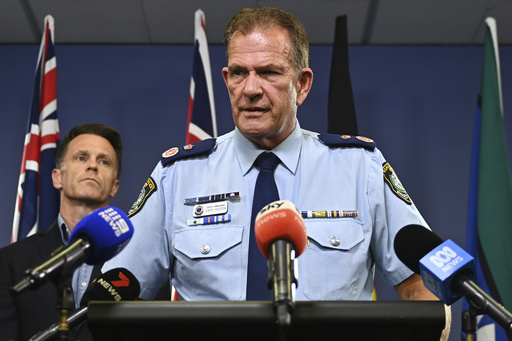
MELBOURNE, Australia — On Thursday morning, Sydney witnessed three additional incidents of antisemitic graffiti, prompting Australian leaders to express concerns about a rising tide of hatred in the community. This comes in the wake of a disturbing find on the outskirts of the city, where law enforcement officials discovered explosives in a trailer along with a list of Jewish targets. State police reported that Powergel, an explosive commonly used in mining, was identified in Dural, a suburb of Sydney. The amount of explosive found had the potential to create a bomb with an effective blast radius of approximately 40 meters (130 feet).
“This undeniably signifies an uptick in race-based hatred and potential violence in New South Wales,” declared Premier Chris Minns during a press briefing on Thursday.
The revelation about the explosives, which police claimed was mistakenly leaked to the media and jeopardized an ongoing investigation, follows months characterized by antisemitic acts such as arson, vandalism, and graffiti targeting areas populated by Jewish residents in Sydney and Melbourne. The latest incidents included graffiti at a Jewish school.
Minns described the situation as “utterly appalling and shameful.” The police investigation into these hate crimes has already led to ten arrests, with expectations for more apprehensions in the future.
In recent months since the onset of the conflict between Israel and Hamas in 2023, acts of targeted arson—some directed at facilities like childcare centers—and incidents of graffiti have surged across Sydney and Melbourne, cities that house 85% of Australia’s Jewish population. One victim has already been reported injured; a worshipper suffered burns from a fire intentionally set at a synagogue in Melbourne last December.
A collaborative counterterrorism unit, comprised of federal and state law enforcement, is currently probing these incidents. Its leaders have also suggested the possibility that foreign entities may be financing criminals to execute these attacks. However, Federal Police Commissioner Reece Kershaw refrained from naming any specific foreign actors associated with these claims.
This narrative gained traction as New South Wales Deputy Police Commissioner David Hudson indicated that some of the assaults appear to be coordinated by external parties rather than solely the individuals arrested. “None of the ten apprehended so far have been linked to any particular ideology that could explain their actions,” Hudson noted. He also mentioned that connections between some offenders’ job roles have been identified, although further details were not provided.
The trailer’s owner was already among those arrested prior to the discovery of the explosives on January 19. Police are investigating the manufacturers of the explosive material, which is exclusively used in the mining sector.
Prime Minister Anthony Albanese responded by acknowledging the potential threat posed by the explosives, stating, “The contents of the trailer were blatantly aimed to harm individuals while also instilling fear within the community.” He supported Minns’ categorization of the situation as a potentially terrorist act, despite state police not officially labeling it as such at this time.
According to police officials, classifying the episode as terrorism would not alter the types of charges applicable to those involved, and they asserted that the public should not fear further risks from the explosives.
Israel’s Foreign Minister, Gideon Saar, condemned the trailer incident as “intolerable” via a social media post. He expressed concern over the unchecked spread of antisemitism in Australia and insisted that the Australian government takes stronger measures to combat this worrying trend.
Peter Wertheim from the Executive Council of Australian Jewry emphasized that the Jewish community in Australia is feeling increasingly anxious. “We are seeing the freedom and civilized norms we have enjoyed slipping away from us,” he lamented.
The topic of antisemitism has stirred political debate as Australia approaches a national election in the coming months. Julian Leeser, a Jewish member of the federal Liberal party representing Dural, remarked that Sydney has been increasingly plagued by antisemitic and terrorist acts targeting law-abiding citizens this year. As the ruling party—the center-left Labor—faces accusations from the right-leaning opposition and some Jewish leaders regarding insufficient responses, the climate around this issue has grown tense.
Conversely, Sarah Schwartz from the Jewish Council of Australia criticized politicians who have leveraged the antisemitism discourse for partisan gain, labeling it as self-serving. However, Leeser rebuffed that criticism, asserting, “This government could have done more.” He called for stronger legal measures against antisemitism, enhanced penalties, and greater interagency collaboration to address the issue effectively.

